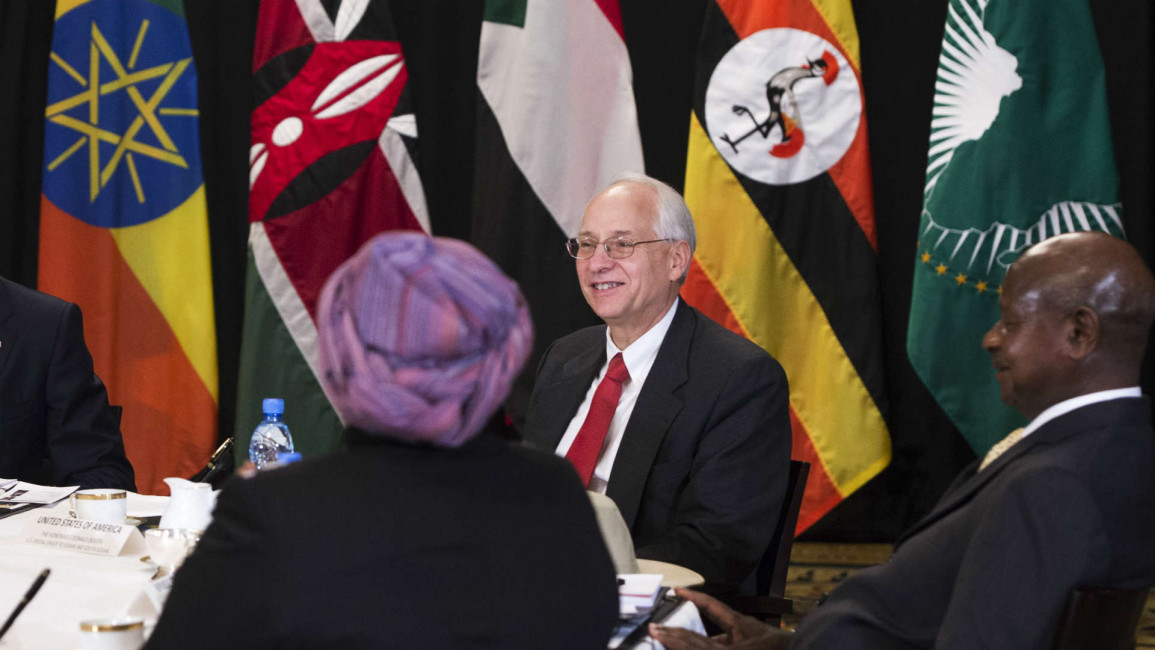Trump's America rolls its sleeves and sends envoy to help sort Sudan crisis
The US sent its newly appointed special envoy to Sudan to meet with the country’s rival factions this week, as Washington aims to ramp up its mediation efforts to help craft a "peaceful solution" to the crisis.
Donald Booth, along with the assistant secretary of state for Africa, Tibor Nagy, met with military council leader General Abdel Fattah al-Burhan on Thursday.
Booth, a veteran diplomat, served as envoy to Sudan and South Sudan under the Obama administration.
Burhan told the envoys that Sudan and its people had a positive view of US efforts to reach a political settlement, according to a statement released by the military council.
Read more: Why is everyone on social media changing their profile pictures into blue?
The pro-democracy movement, the Alliance for Freedom and Change, said its leaders had briefed the two US officials on Wednesday on the need for a transparent investigation into the June 3 massacre of protesters in Khartoum by security forces and militias allied with the military council.
The military council admitted on Thursday that “mistakes happened” that led to the killing of protesters while dispersing the sit-in.
Amnesty International called the admission “completely outrageous and unacceptable”.
Twitter Post
|
The alliance also called for the withdrawal of such militias from the streets in Khartoum and other towns, the lifting of an internet blockade and the establishment of a civilian administration, it said in a statement.
Speaking to The New Arab’s sister website, the alliance’s leader Wajdi Saleh welcomed the appointment of Douglas Booth as a special envoy to Sudan.
Saleh said that Booth reiterated US support for the establishment of a transitional civilian authority to guide the country out of its current crisis.
The African Union, which suspended Sudan following the crackdown, lauded the fact that global efforts were being made to resolve the crisis.
The AU's special envoy to Sudan, Mohamed El Hacen Lebatt, said an international team of diplomats was working to resolve the crisis and that separate discussions with the two sides were "moving forward".
Demand for guarantees
The US diplomats were also expected to meet with top envoys from Saudi Arabia, the United Arab Emirates and Egypt in Khartoum.
The three key regional powers back the generals, and are against the idea of democracy blossoming so close to home, observers have noted.
Days after Bashir's overthrow in April, Saudi Arabia and the UAE offered a $3-billion aid package to Khartoum, including a $500-million cash injection into the central bank to help support the Sudanese pound, which has plunged against the dollar.
The country's worsening economic crisis was one initial trigger for protests against Bashir's three-decade rule.
Read more: Sudan: Who is Hemedti? The man behind the massacres
On Thursday, prosecutors charged him with corruption and "possessing foreign funds, acquiring suspect and illegal wealth" and putting in place a state of emergency, state media reported.
Last month, Sudan's public prosecutor ordered the questioning of Bashir, who is being held in Khartoum's Kober prison, over money-laundering and "financing terrorism".
Talks between the protest leaders and generals collapsed in mid-May over the question of who should lead a new governing body - a civilian or a soldier.
Relations worsened following the crackdown, with protest leaders now insisting any agreement reached with the military rulers must be backed by "regional and international" guarantees.



